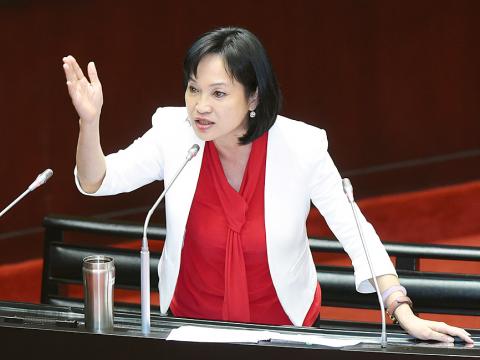The results of Saturday’s nine-in-one elections represented a failure of the Democratic Progressive Party (DPP), not a victory for the Chinese Nationalist Party (KMT), KMT Legislator Ko Chih-en (柯志恩) said on Sunday.
The KMT must not misread the situation and must continue to reform itself to win back votes from the DPP, Ko said.
The KMT won mayoral races in 15 counties and cities, up from six, while the DPP won only six, down from 13.

Photo: Liao Chen-huei, Taipei Times
Key KMT candidates, including Kaohsiung mayor-elect Han Kuo-yu (韓國瑜) and New Taipei City mayor-elect Hou You-yi (侯友宜), are different from typical KMT politicians, Ko said, adding that the two relied on their unique personalities.
“The outcome shows that people do not like the DPP, but that does not necessarily mean they like the KMT. This is something the party must realize,” she said.
KMT Legislator Wang Jin-pyng (王金平) said the biggest reason for the DPP’s losses was a change in public sentiment.
All of the DPP’s actions since the party took office helped the campaigns of KMT candidates, Wang said.
KMT Legislator Lin Wei-chou (林為洲) said that voters expressed their dissatisfaction with the DPP, but not necessarily their approval of the KMT.
The KMT must urgently get to work turning dissatisfied DPP supporters into KMT supporters before the 2020 presidential election, Lin said.
The KMT must reform and should learn from Han’s campaign success, which would include better engagement with voters online and more emphasis on the charisma of individual candidates, he said, adding that the party could not rely on its traditional organizational strategies.
A source within the KMT who asked to remain anonymous said that there was hope that older members would soon retire.
However, the party’s successes on Saturday means that older members would probably join the 2020 elections rather than retire, the source said.
The boost in morale that Han has given party members means there will likely be an explosion in the number of KMT members who want to enter the party’s 2020 nomination process, the source said, adding that the party would be obligated ensure a fair competition.

Taiwan is stepping up plans to create self-sufficient supply chains for combat drones and increase foreign orders from the US to counter China’s numerical superiority, a defense official said on Saturday. Commenting on condition of anonymity, the official said the nation’s armed forces are in agreement with US Admiral Samuel Paparo’s assessment that Taiwan’s military must be prepared to turn the nation’s waters into a “hellscape” for the Chinese People’s Liberation Army (PLA). Paparo, the commander of the US Indo-Pacific Command, reiterated the concept during a Congressional hearing in Washington on Wednesday. He first coined the term in a security conference last

Prosecutors today declined to say who was questioned regarding alleged forgery on petitions to recall Democratic Progressive Party (DPP) legislators, after Chinese-language media earlier reported that members of the Chinese Nationalist Party (KMT) Youth League were brought in for questioning. The Ministry of Justice Investigation Bureau confirmed that two people had been questioned, but did not disclose any further information about the ongoing investigation. KMT Youth League members Lee Hsiao-liang (李孝亮) and Liu Szu-yin (劉思吟) — who are leading the effort to recall DPP caucus chief executive Rosalia Wu (吳思瑤) and Legislator Wu Pei-yi (吳沛憶) — both posted on Facebook saying: “I

Sung Chien-liang (宋建樑), who led efforts to recall Democratic Progressive Party (DPP) Legislator Lee Kun-cheng (李坤城), was released on bail of NT$80,000 today amid outcry over his decision to wear a Nazi armband to questioning the night before. Sung arrived at the New Taipei District Prosecutors’ Office for questioning in a recall petition forgery case last night wearing a red armband bearing a swastika, carrying a copy of Adolf Hitler’s Mein Kampf and giving a Nazi salute. Sung left the building at 1:15am without the armband and covering the book with his coat. Lee said today that this is a serious

A mountain blaze that broke out yesterday morning in Yangmingshan National Park was put out after five hours, following multi agency efforts involving dozens of fire trucks and helicopter water drops. The fire might have been sparked by an air quality sensor operated by the National Center for High-Performance Computing, one of the national-level laboratories under the National Applied Research Laboratories, Yangmingshan National Park Headquarters said. The Taipei City Fire Department said the fire, which broke out at about 11am yesterday near the mountainous Xiaoyoukeng (小油坑) Recreation Area was extinguished at 4:32pm. It had initially dispatched 72 personnel in four command vehicles, 16